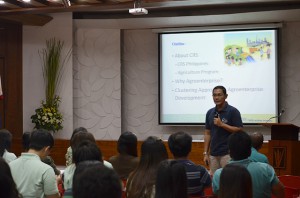Integration and clustering are seen as vital mechanisms to drive progress in rural farming communities; entrepreneurs convened at the Philippine Rice Research Institute said. 
In a recent seminar conducted at PhilRice in Science City of Muñoz, Nueva Ecija, Ramon Peñalosa Jr., farmer scientist, said that attaining 1M income from agriculture is possible with integration.
“Integrated farming is like a 1+1 = 50, it’s a no-brainer. You can go from the farm to market, farm to plate, and farm to kitchen which means you will not be dependent anymore to industry or competition because you now have different posts of columns. It is like building a house; the more posts you have, the stronger your foundation,” Peñalosa said.
Peñalosa practices a closed-loop system of production in his farm in Victoria City, Negros Occidental. He raises animals from ruminants, livestock to poultry, cultivates fruits, vegetables, and other high-value crops, and markets his produce on-site.
“We produce everything we need and put wastes into use,” Peñalosa added.
PhilRice officer-in-charge Edilberto de Luna agreed with the millionaire-farmer saying that, “our farmers need to have vertical and horizontal integration. Horizontal which is maximizing the use of their farm while vertical is finding more ways in marketing their produce.”
Meanwhile, Lionel Mendoza, Program Manager for Operations- Agriculture Program of the Catholic Relief Services, shared that by clustering farmers, products are easily gathered and supply and information are easily shared.
“We found that it is not enough that we help farmers in production. It is not enough that we provide technology to increase their yield. Farmers experience challenges such as inexperience in marketing and lack of capital and support in infrastructure and organizational management,” Mendoza stated.
By forming into a cooperative, Mendoza said that farmers are linked to institutional buyers such as major corporate food chains.
Clustering approach, Mendoza said, entails partnership building and cluster formation, product selection and supply assessment, market chain study, cluster commitment, business planning, product organizing, test marketing, and sustained enterprises.
Currently, PhilRice through its Rural Transformation Movement, partners with local government units, state colleges and the universities, market players, and private organizations to form NUESTRA or nucleus in the community, where farmer-partners are provided with integrated technical, capital, and market assistance.




